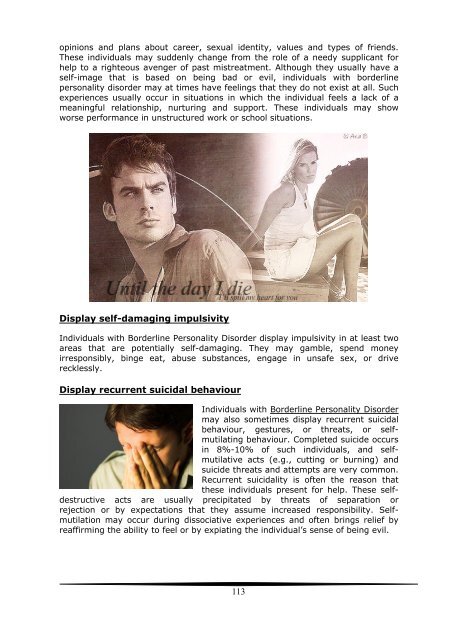personality disorders explained
Antisocial Personality Disorder, Codependence, Narcissism and Borderline
Antisocial Personality Disorder, Codependence, Narcissism and Borderline
Create successful ePaper yourself
Turn your PDF publications into a flip-book with our unique Google optimized e-Paper software.
opinions and plans about career, sexual identity, values and types of friends.<br />
These individuals may suddenly change from the role of a needy supplicant for<br />
help to a righteous avenger of past mistreatment. Although they usually have a<br />
self-image that is based on being bad or evil, individuals with borderline<br />
<strong>personality</strong> disorder may at times have feelings that they do not exist at all. Such<br />
experiences usually occur in situations in which the individual feels a lack of a<br />
meaningful relationship, nurturing and support. These individuals may show<br />
worse performance in unstructured work or school situations.<br />
Display self-damaging impulsivity<br />
Individuals with Borderline Personality Disorder display impulsivity in at least two<br />
areas that are potentially self-damaging. They may gamble, spend money<br />
irresponsibly, binge eat, abuse substances, engage in unsafe sex, or drive<br />
recklessly.<br />
Display recurrent suicidal behaviour<br />
Individuals with Borderline Personality Disorder<br />
may also sometimes display recurrent suicidal<br />
behaviour, gestures, or threats, or selfmutilating<br />
behaviour. Completed suicide occurs<br />
in 8%-10% of such individuals, and selfmutilative<br />
acts (e.g., cutting or burning) and<br />
suicide threats and attempts are very common.<br />
Recurrent suicidality is often the reason that<br />
these individuals present for help. These selfdestructive<br />
acts are usually precipitated by threats of separation or<br />
rejection or by expectations that they assume increased responsibility. Selfmutilation<br />
may occur during dissociative experiences and often brings relief by<br />
reaffirming the ability to feel or by expiating the individual’s sense of being evil.<br />
113

















